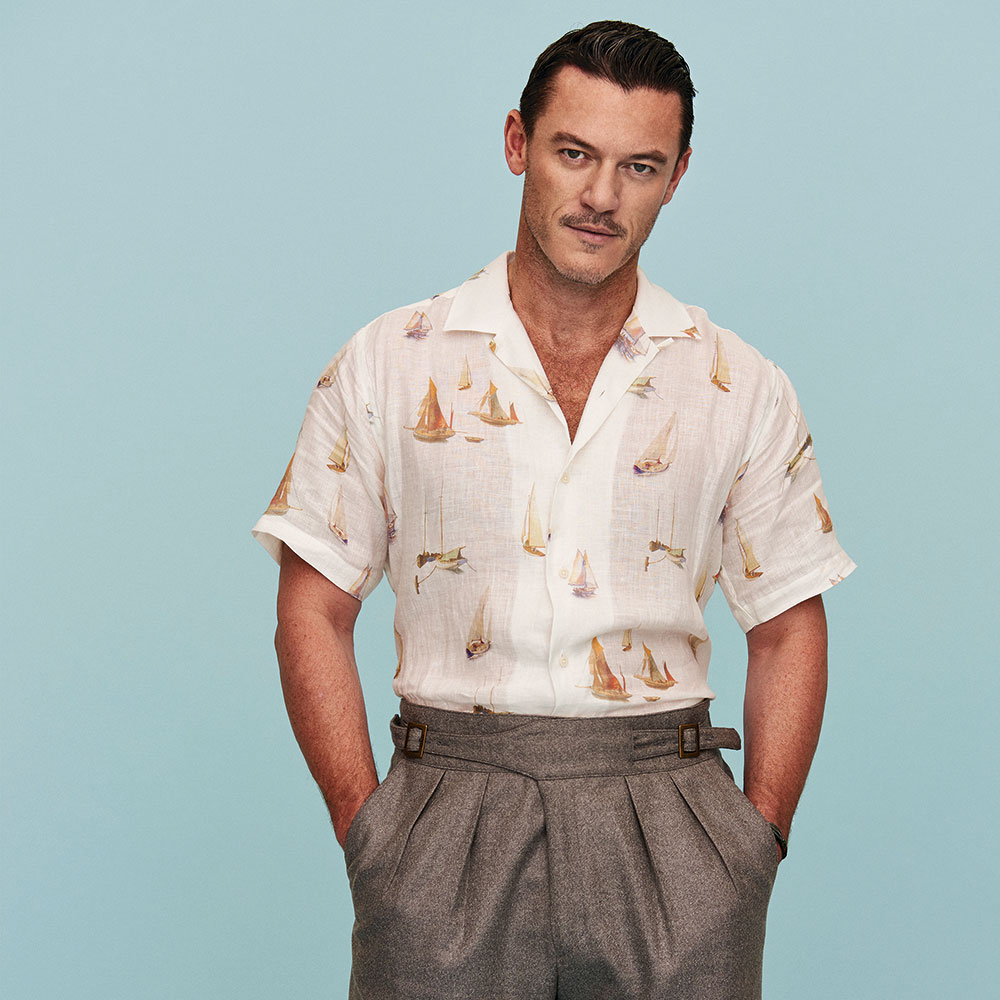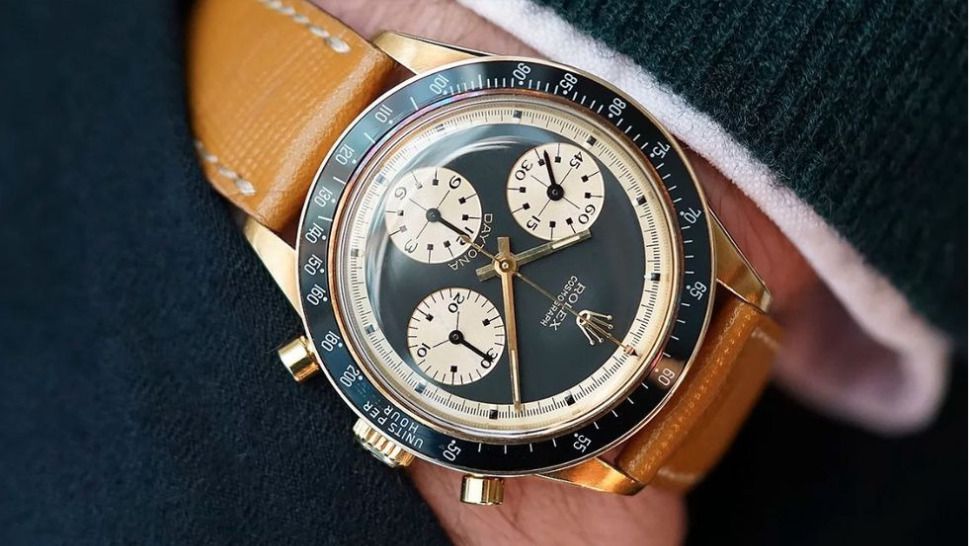Deep in the underbelly of a nondescript hotel somewhere in the outskirts of Rome, Luke Evans is sitting in a windowless room sipping a disappointing cup of coffee.
He taps his fingers absentmindedly on his cinnamon vape as a crackling phone line spits a jarring duet of dial-tone and static at him. He’s taking an early morning call from Dubai. It’s his birthday.
“I really wish I could tell you that I was on the edge of the Trevi Fountain throwing a coin over my right shoulder and wishing for peace on Earth, but I’m not,” he tells Esquire before chuckling, “I’m really not.”
Worry not, the coin throwing will come later in the day — as documented on his Instagram account — when he will spend a few hours visiting choice sites of the Eternal City at his leisure.
He’s in Rome having been invited by the Italian shoe company Tod’s to celebrate his birthday — his 39th. Such are the perks of being an in-demand leading man whose face is currently plastered on billboards and the side of buses promoting the release of his new TV show, The Alienist, on Netflix.
For now Rome — and its fountains — can wait; Luke Evans has work to do.

“What I do for a living can be so random at times,” he explains, as if despite being involved in some of the highest-grossing film franchises of all time (Fast and Furious and The Hobbit) he almost struggles to believe it himself.
“Essentially, all I’m doing is entertaining people for a couple of hours, and for some reason that makes everyone want to know you.” It’s a refreshingly simplified view of a profession, and industry, that has a tendency to grandstand and overstate its own importance. And to understand that, is to better understand Luke Evans.
Raised in a small village in the rural Welsh valleys, Evans is the only child of a bricklayer and a cleaner. A tight-knit family, they would support his decision to channel all his creative energy into studying the stage arts at the age of 16.
“I come from a family who couldn’t give a s**t about having nice clothes, or the biggest house, or the best car. Where I grew up, things were much more simplistic than that, and it makes them all a very happy bunch of people,” he says.
We discuss his parents and he mentions that he is particularly close to his mother, a kind and supportive woman who kept on encouraging him to sing and perform, even when he was singled out as a regular target for school toughs. “Bullying is a horrible thing, and it can do a lot to make a young boy introverted,” he says. “But it was important that I didn’t let it define me or my character. In fact, I’d say it made me a stronger person to this day.”
Having identified his passion, Evans left school a year later on a full scholarship to the famed London Studio Centre.

His classical training and powerful singing voice saw Evans star in many of London’s West End productions from 2000 to 2008, including La Cava, Taboo, Miss Saigon and Avenue Q. Although, despite a growing reputation, leading-man good looks and chiselled features, it wasn’t until he was 30 that he was cast in his first feature film — fittingly playing the Greek god Apollo in the 2010 remake of Clash of the Titans.
From that point, Evans has rarely been out of work, with notable roles as Bard The Bowman in Peter Jackson’s The Hobbit trilogy (2012-2014); Vlad The Impaler in Dracula Untold (2014); and playing the British baddie in Furious 7 (2015). Managing to avoid being typecast is a delicate skill that few actors possess, but the reason for the diversity of roles on Evans’ resumé is rather unexpected.
“I get bored really easily!” he laughs before quickly switching to a more serious tone. “Ultimately, I think that’s what fuels me to play such a wide variety of characters [is that] if you keep accepting the same roles then you’re not going to learn anything. The challenge is to push yourself to broaden your abilities as an actor. Sure, you might fail, but that’s what keeps this business interesting. I’d get too bored playing the same character over and over. I just couldn’t do that. I’d rather not be an actor.”
***
Luke Evans is humming. London has been hit by a rare April heatwave, and its effect on people is instantly uplifting.
Just back from Rome — looking tanned (and very Italian) — Evans is on a charm offensive from the moment he walks onto the White Rabbit studio for the Esquire shoot. Dressed in a summery printed shirt, skinny jeans, brown leather jacket and, naturally, a new pair of clean white Tod’s sneakers, his cheerfulness seems effortlessly authentic.
He goes over to explore the clothing rails, which are full of Fifties-inspired summer tailoring. With a muscular physique that is practically custom-built to look good in classic suiting, he is intrigued by the options of on-trend Riviera casual pieces selected for him.
Keen to try on every outfit, he is rather smitten with the selection of Grenson shoes, and the high-waisted trousers. “It’s not something that I’d ever think to wear, but now I’ve tried them it is definitely something that I could see myself wearing to somewhere like Cannes,” he says.

When it comes time to the shoot, there is a notable change of attitude. Between shots he sings along to the Madonna-heavy playlist, but when the camera is ready his professionalism takes over. Engaging with the photographer and stylist, he comments on the images, takes direction, suggests ideas and shows a willing to be involved in the creative process.
It has been a good week for Evans. In addition to the shoot and his Roman holiday, he is just two days removed from singing on stage at London’s Royal Albert Hall for the televised Queen’s Birthday Party event. Still buzzing from the experience, between the outfit changes he shares stories of hanging out at the after-party with Kylie Minogue, and admits to being starstruck when seeing fellow countryman Tom Jones.
Does he feel particularly Welsh? “I am 150 percent Welsh,” he laughs. “I’m hugely proud of our heritage, and think for a little nation we’ve done rather well to put ourselves on the map, culturally.”
It doesn’t take him long to corroborate a friendly stereotype that Welsh people will always make a point of highlighting one of their famous countrymen or women. “It’s true! We do do that!” he laughs. “The other night in Rome, the singer Duffy was playing a gig in the city. I actually texted a friend just to let him know that she was Welsh too!”
***
There’s a shot early on in the pilot episode of The Alienist, in which the viewer is treated to a bird’s-eye view of a child’s body, whose savaged remains have been laid out on top of a newly constructed Williamsburg Bridge.
Evans’ character John Moore — a newspaper-illustrator-turned-crime-scene-investigator — reels away in disgust, retching. The rather brutal scene is a statement of intent by the producers of the 10-part series based on Caleb Carr’s best-selling novel, and showcases 1896 New York City in all its grim glory.
“What was wonderful about The Alienist is that it doesn’t mince its words and try to glamorise things. It doesn’t try to show turn-of-the-century New York in its best light; it just tries to be accurate,” says Evans. “Although it was the Gilded Age of New York, there was an extremely desperate and dark edge to the city. Sinister and unlawful.”
While the show screened on TNT in the US earlier this year, it is now available on Netflix across the Arabian Gulf. The dangerously watchable show isn’t starkly original, but has a bellyful of confidence.
The title role in The Alienist is taken by fine German-Spanish actor Daniel Brühl as the eccentric Dr Laszlo Kreizler, but rather than someone who is an expert on little green men, ‘alienist’ is a term for someone who studies the mentally ill, in this instance with a view to understanding the behaviour of a potential serial killer on the loose.
In this endeavour Kreizler is helped by Evans’ Moore and plucky police secretary Sara Howard (Dakota Fanning), in a period crime drama that is — like the best of its kind — grisly, gloomy and blissfully camp.

Although he is partial to good binge-watch, Evans originally watched The Alienist as it aired weekly in America, waiting like everyone else with bated breath for the next episode. “It has a wonderful, immersive cinematic quality to it, which I felt became more immersive with each episode,” he says. “Now on Netflix, I can see it being a case of people just letting each episode roll over into the next one, and then the next one.”
During the filming, Evans spent seven months in Budapest, working on a huge, purpose-built lot meticulously designed to recreate the period setting: “The sets were so vast, and the costumes and environments were so on point that sometimes after doing a scene you would have to remind yourself that it wasn’t real,” he says.
Turn-of-the-century New York; medieval Transylvania; Peter Jackson’s Middle Earth — long shoots and massive-scale sets are now par for the course for Evans, who again smiles and shakes his head when he admits that this is everything that he dreamed the profession would be when he started out.
“I swear, sometimes I feel like a time traveller,” he says. “Getting to experience different worlds and time periods. When I think back to musical theatre and how much fun it was just playing on a simple stage. Now my stage is so much bigger.”

With regards to his role as Bard The Bowman, the term ‘big’ is an understatement. “I would love to spend a summer in Laketown,” he responds when asked if he could live in any of the places he has ‘time travelled’ to.
“It was a stilted set built over water in one of the biggest sound studios in the Southern Hemisphere. It was extraordinary. We could make it dawn or dark at the touch of a button. We could have ice floating in the water or steam rising off it whenever we wanted. It was always the first thing I showed friends who came down to New Zealand to visit me during the year I was there. If I was given the keys to it, I reckon I could have some real fun there.”
***
In each setting, the Luke Evans you get is the same: a fun, personable guy with a dry, self-deprecating wit. He is comfortable with people around him, but always ready to switch into work mode in an instant.
Claiming not to be someone who needs to stay in character on set, being able to switch on and off is a skill that has helped him throughout his career. “I do a lot of preparation and work out the psychology very early in my rehearsal stage, so I know how to turn it on and off,” he explains.
“There are times when it takes longer — if I’m playing a dark character or dealing with hard subject material — but you have to be able to do it, otherwise you’ll go totally crazy.”
We mention that Sir Anthony Hopkins once told us about something very similar. “Did he? Well, that’s good! He’s a man who knows what he’s doing,” he says, before adding: “He’s Welsh too, you know.”
The Alienist is out on Netflix now.



